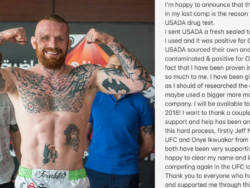The trouble with Ostarine: Jimmy Wallhead’s
16th March 2018
Features


Statements issued by the International Paralympic Committee (IPC) and the Athlete Commission of UK Anti-Doping (UKAD) have highlighted the conflicting pressures that the World Anti-Doping Agency (WADA) will be under when it considers whether the Russian Anti-Doping Agency (RUSADA) should be reinstated at its 20 September Executive Committee meeting in the Seychelles. The IPC has warned that WADA and Russia need to make progress on the two outstanding issues in WADA’s Roadmap to Compliance that have yet to be resolved, as delays are costing it money. The UKAD Athlete Commission statement is more direct, and asks WADA not to reinstate RUSADA until the remaining two conditions have been fulfilled.
“The IPC is growing increasingly concerned at the ongoing stalemate between RUSADA and WADA”, said IPC President Andrew Parsons in a statement. “In the last two years a lot of positive change has occurred in Russia regarding anti-doping. RUSADA is now functioning well and Russian athletes are amongst the most tested and scrutinised athletes in the world. What is stopping the reinstatement however is the lack of a suitable response to the McLaren Report and the stubbornness of Russian authorities to provide access to the Moscow laboratory. This is ultimately preventing the reinstatement of RUSADA by WADA.”
The IPC’s statement explained that other than the two conditions outlined above, the only remaining condition for the Russian Paralympic Committee (RPC) to be reinstated was for it to reimburse the IPC for costs relating to the the continued testing of Russian para athletes and for the IPC Taskforce, which monitored the RPC’s progress in achieving the IPC’s requirements for reinstatement. It outlined that these costs currently stand at €257,500.
‘On behalf of the UK Anti-Doping Athlete Commission, and fellow international athletes, we write to you to insist you and the WADA Executive Committee vote to maintain WADA’s current position on the reinstatement of Russia’, read the UKAD Athlete Commission letter to Craig Reedie, President of WADA. ‘Two of the conditions directed by the Russia Roadmap have not yet been met, and to readmit them despite this would be a catastrophe for clean sport […] We, the athletes, insist you hold the line on the Roadmap. Do not U-turn. Do not fail Clean Sport.’
As outlined in the most recently available update on WADA’s Roadmap to Compliance, the two remaining ‘milestones’ that must be achieved are:
That these ‘milestones’ will be achieved by 20 September looks unlikely. As reported by The Sports Integrity Initiative, Igor Sidorkevich (Игорь Сидоркевич) has been appointed Russia’s Deputy Minister of Sports and put in charge of implementing its National Anti-Doping Plan (NADP), which codifies the view that State-sponsored doping did not take place in Russia. If the NADP is implemented in its current form, this will make achieving the first ‘milestone’ impossible.
Urine samples in the Moscow Laboratory remain sealed off due to a criminal investigation into allegations of Russian doping launched by the Investigative Committee of the Russian Federation (SKR or Sledcom) on 8 June 2016. Ten days later, the SKR charged Dr. Grigory Rodchenkov, former Director of the Moscow Laboratory with abuse of power under Russia’s Criminal Code.
On 8 November 2017, the SKR issued separate charges against Dr. Rodchenkov and his former assistant, Tim Sobolevsky, for obstructing its initial investigation by allegedly offering financial rewards to Russians in return for the supply of the Moscow Laboratory Information Management System (LIMS) to WADA. It therefore appears unlikely that the second ‘milestone’ will be achieved, as the SKR is unlikely to turn over the stored samples to WADA until its investigations are complete, and no end dates have been specified.
• Eleven athletes (and a horse trainer) from eleven countries, competing in nine sports, were...
• 20 athletes from nine countries, competing in ten sports, were involved in anti-doping proceedings...
• Twenty four athletes from 13 countries, competing in eight sports, were involved in anti-doping...